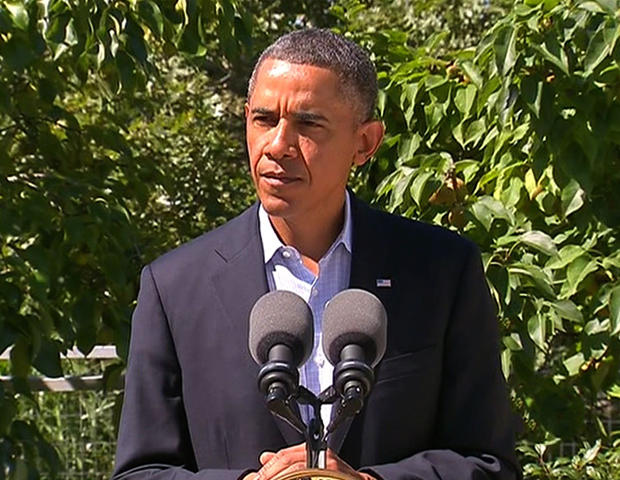What's at stake for the U.S. in the Egypt crisis?
(CBS News) With the death toll mounting in Egypt, so too is worldwide condemnation of the brutal crackdown on supporters of President Mohammed Morsi, who was ousted last month in a military coup. President Obama retaliated against the Egyptian military by cancelling joint military exercises that the u.s. holds with Egypt every two years. But Mr. Obama did not suspend the more than $1 billion in military aid the U.S. gives Egypt each year.
On vacation at Martha's Vineyard, Mr. Obama had this to say:
"We deplore violence against civilians. We support universal rights essential to human dignity, including the right to peaceful protest. We oppose the pursuit of martial law, which denies those rights to citizens under the principle that security trumps individual freedom, or that might makes right. And today, the United States extends its condolences to the families of those who were killed and those who were wounded."
"Evening News" anchor Scott Pelley spoke with Juan Zarate, a deputy national security advisor in the George W. Bush administration, who is now a CBS senior national security analyst; and CBS chief White House correspondent Major Garrett. A transcript of that conversation follows.
Pelley: Major, what did the administration do to try to head this off?
Watch CBS News correspondent Charlie D'Agata's latest report from Cairo below as the bodies mount in the Egyptian clash:
Garrett: Scott, behind the scenes, the administration proposed at least two diplomatic options and it sent Deputy Secretary of State Bill Burns to Cairo to deliver them and asked Republican Sens. John McCain and Lindsey Graham to back them up. One called for Mohamed Morsi to return to power briefly, resign, and then set a political reconciliation process in motion. The other called for the Egyptian military to find alternative representatives within Morsi's Muslim Brotherhood movement through which they could pursue a political compromise. When those efforts failed, up-to-the-last minute administration officials urged Egyptian military to use restraint - but to no avail.
Pelley: Juan, what's at stake for the United States?
Zarate: Egypt is the most populous and influential Arab country. Often it's said as Egypt goes, so goes the Arab world. It's also a cornerstone of stability in the region: the peace treaty with Israel, security with the Suez Canal, and the Sinai. It's a key U.S. ally on issues like Syria, Iran, and terrorism. So what happens in Egypt matters to the United States.
Pelley: Juan, when the coup happened last month, the Obama administration did not condemn it. Did that serve to encourage the military?
Deadly force authorized for Egypt's police
Obama: Violence in Egypt "needs to stop"
White House "strongly condemns" Egypt violence
Zarate: It could have, Scott. I think administration didn't want to tie its hands. It wanted to maintain flexibility, the ability to the continue funding the military, to have some leverage on what happened in Egypt and on the decision-making. The problem is it may have appeared to have been a sacrifice of our laws and principles for the sake of stability.
Pelley: Major, what's next? The president's options seem pretty limited.
Garrett: Well, the president could suspend some or all of that estimated $1 billion in annual U.S. aid to Egypt. He could also discourage international lending and foreign investment in Egypt. What's clear is the calibrated attempt the administration has had to redirect Egyptian policy has failed and the president's patience is wearing thin. One top official told me today -- and these are his words -- "we cannot sustain a relationship with Egypt if these actions continue."

